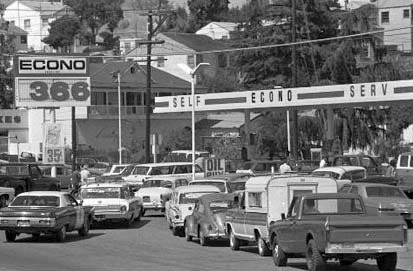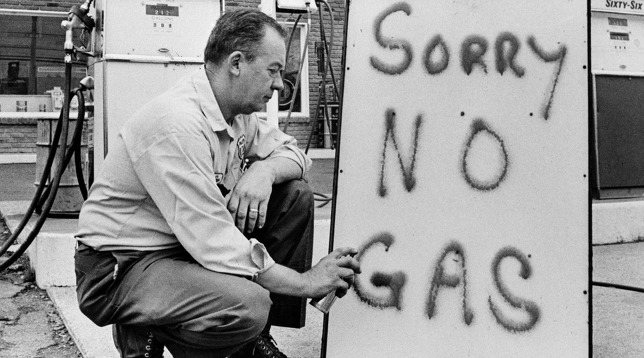Dependency on combustible fuels is something every serious prepper must address. Ideally, your bug-out plan will lead you to a situation where you can afford to drastically limit your reliance on all fuels, but post-catastrophe fuel-budgeting is a topic for another time. For now, let's assume that there are two main types of fuel storage and stockpiling to prepare for: a bug-out event and long-term stockpiling at your retreat. Safe long-term fuel storage takes a little know-how, planning and discipline
Obviously if you're just heading up to your cabin or camp for the weekend you may be able to spare the time to stop for gasoline before heading out of town, but in a true public emergency situation, it doesn't take long for long line-ups to form at the gas station. Stress from an emergency or fears of shortages will cause tempers will flare and, depending on what the crisis is that you're fleeing, that might be the last place you want to be stuck. Make sure your bug-out plan includes an allowance for plenty of fuel to get you where you want to go. Know how much fuel you need to reach your destination and make sure your vehicle has that much aboard with some margin for error. If you plan to go a long way, be sure you know every spot along multiple routes so you can resupply on the way. Plan for scenarios where you must take alternate routes that might be longer, slower, or rougher than you expected. Get to know your bug-out vehicle's fuel efficiency at different rates of speed. Cars and trucks are most fuel-efficient within a specific range speeds, so work that into your calculations, too.

So now you know how much gasoline or diesel you'll probably need in a worst-case scenario to bug out and you've planned ahead by adding fuel capacity, either a bigger tank or extra jerry cans. Now you can park your rig out of sight and rest easy, right? Not quite. Depending on what fuel your vehicle burns, you need to deal with safe long-term fuel storage, unless the event you're planning for takes place in 6 months or so. For most people, the easiest way to deal with this is to make sure you run the vehicle and cycle any spare fuel into the tank, rather than leaving gas in the spare cans for an unknown period. If you can't run the vehicle for extended periods, you may have to take more drastic steps to cycle the fuel, but that's the best method.
But wait a minute! What if your plans don't involve a car, truck, or MPV? No worries about fuel then, right? Not quite! Even if you plan to escape by mountain bike, on horseback, or on your own two feet, you still need to consider methods of safe long-term fuel storage, unless you expect to be utterly nomadic after things go south. When you arrive at your destination, you'll need some way to cook, to stay warm or any number of other things you'll need to fuel. And for those of you who did take the truck to your shelter in the back of beyond, you'll need to have a reliable fuel stockpile for that, too. So let's look at long-term storage at your bug-out cabin or camp next.
But first, please help us out and sign up for free to become a member of our Survivors Alliance group to unlock the rest of this article:

How does this work? fuel goes bad after time.
LP last a lot longer.
Right that’s what I said to myself, I would think, storing propane or natural gas is better, you can get converters for your vehicle as well. I’m not sure if kerosene is good for long term or not, personally I would only use a vehicle initially after that your basically painting a target on yourself
Production > Storage.
If you use fuel stabilizer it will last years that’s what you’re supposed to put in your gas tank if you’re storing your car for an extended amount of time
Steve Lagasse here ya go
Jeff Kounter
I would like to know the longest lasting fuel I’ve dealt with is jet-a which is basically diesel with a lot of additives, kinda wanna known cuz having long storage fuel is definitely a personal game changer
Just put a pickle in each five gallon jug. The acid in the pickle will keep the gas fresh and ready for use. It will also provide a tasty treat when food is scarce.
I’ve consistently used 1-2 year old unstabilized low octane gasoline in all my equipment and vehicles for the last 20 years even after it became 10% ethanol without any problem whatsoever.
Diesel will last a very long time like 15 years
Use propane; you can readily buy it in bulk delivered and it never goes bad in storage.
A Wood Gasifier turns wood into a gas the can be handled like natural gas, if you use a propane pump to pump it into a Propane tank you have both production and the ability to fill smaller tanks to put in vehicles. You can buy Wood Gasifier Generators (a gas generator of the back end of the Wood Gasifier) online now.
https://en.wikipedia.org/wiki/Wood_gas_generator
They sell fuel additives at Walmart to extend the life of your fuel
Propane goes bad also
Yea, not quite that fast though, probably most reliable would be kerosene right
sad thing is the fuel turns to varnish after time rendering it usless
Not yrs….about 1 yr using 93 octane and stabil marine stabilization. Diesel alittle longer.
Nope not anymore, when they took sulfur out of diesel it doesn’t last very long anymore unless you add stable diesel stabilizer to it and it might last maybe 2 years but will not quite give you as much bang for the buck in the end when you do burn it it’s best to put stable in it and rotate the source so that you constantly have nothing older than one year
That may be true I just know that the older diesel and heating oil last for 15+ years
I think years is accurate enough. Idk About you but ive used fuel that has sat in the can for a year. That’s without the octane.
Yes it goes bad… Very bad. And sometimes it needs to be punished…. It basicaly turns to lacquer since it’s organic compositions break down.
Some of has to do with how old the engine is. Newer Diesel engines are a lot more finicky with the computers. Meanwhile my old IDI 7.3L still fired up like new off decade old fuel.
See you know lol. This is why I’m not interested in running anything newer than what I currently have. Something to be said about being able to drain the transformer off a power pole and just dump it in your tank.
Stabil
Premium fuel lasts for multiple years. I know from experience. Granted, i wouldn’t be running a vehicle with old gas in it at high r.p.m’s but it will still run.
I store alcohol. We had a power outage last night, but I had light in my home.
Octane has nothing to do with it at all. Use whatever octane the engine you are putting it in calls for. Stabil will keep it for about 6 months in a humid environment like Florida unless you use ethanol free which is preferred. That will last about 9 months. What happens is that the additives break down over time and ethanol is hydroscopic.
Bob Peisley
Daniel Boone
I just stay active with my fuel storage. 10 x 5 gallon containers, not much, but enough to last to aquire a full assessment of the situation.
My method is simple. I keep my fuel stored no more than 4 months at a time. I put Sticky notes on the cans with the dates of purchase written on them.
Usually, the cans on 3 months, ill use in my car, as not to waste it, and refill… Writing the new date of purchase on the Sticky Note.
Basically, I rotate, use and avoid wasting.
Ok I put a fuel stabilizer in the gas how long will it stay good.